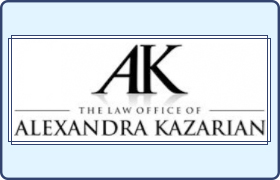Sunland White Collar Crime Lawyer, California
Sponsored Law Firm
-
 x
x

Click For More Info:
-
The Law Office of Alexandra Kazarian
15851 Whittier Blvd Whittier, CA 90603» view mapCriminal Law Aggressive & Experienced Criminal Defense
Trust the Law Office of Alexandra Kazarian with your Criminal Defense Case in Whittier & Los Angeles California.
800-773-5851
Gina Tennen
✓ VERIFIEDCriminal, Military, Juvenile Law, White Collar Crime, RICO Act
LibertyBell Law Group consists of a group of elite criminal defense attorneys who have become some of the most sought after lawyers in the nation. Our... (more)
Michael M. Levin
Criminal, DUI-DWI, Felony, White Collar Crime, Misdemeanor
Status: In Good Standing Licensed: 29 Years
FREE CONSULTATION
CONTACTJonathan Hillel Colman
White Collar Crime, Insurance, Credit & Debt, Personal Injury
Status: In Good Standing
Arpa Bagrad Stepanian
Commercial Real Estate, White Collar Crime, Criminal, Business
Status: In Good Standing Licensed: 22 Years
Garret Weinrieb
Felony, Misdemeanor, DUI-DWI, White Collar Crime
Status: In Good Standing Licensed: 21 Years
FREE CONSULTATION
CONTACTFrederick Matthew Goldberg
Juvenile Law, Traffic, Domestic Violence & Neglect, White Collar Crime
Status: Inactive
Jeffrey Lewis Bear
White Collar Crime, Medical Malpractice, Health Care, Mass Torts, Products Liability
Status: In Good Standing Licensed: 53 Years
Daniel Lawrence Germain
Employee Rights, White Collar Crime, Antitrust, Personal Injury
Status: In Good Standing Licensed: 35 Years
Tarik S Adlai
Litigation, Federal Appellate Practice, White Collar Crime, Civil Rights
Status: In Good Standing Licensed: 32 Years

 Alexandra Kazarian Whittier, CA
Alexandra Kazarian Whittier, CA AboutAlexandra Kazarian Law Firm
AboutAlexandra Kazarian Law Firm Practice AreasExpertise
Practice AreasExpertise

